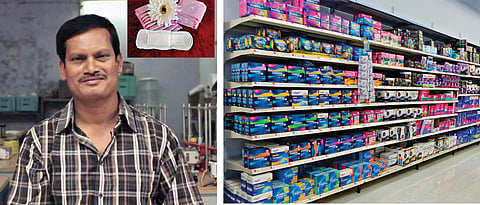

Menses and talking about it is still a taboo in India. Though many NGOs and celebrities are working towards sensitising youths and creating awareness about the biological process concerning women, a lot needs to be done to achieve the purpose.
In February this year, when Akshay Kumar starrer ‘Padman’, a movie based on real-life hero Arunachalam Muruganantham from Tamil Nadu, who launched low-cost sanitary napkin for ‘safe periods’, hit the cinema theatres, people started talking about menstruation and the ordeal a woman goes through during menstruation. To garner more support for his film and remove the taboo connected to women’s monthly cycle, Bollywood couple Twinkle Khanna and Akshay Kumar threw the #PadManChallenge on twitter. This was well received by the cine stars, who posed with a sanitary napkin and posted their pictures and also challenged other celebrities to do the same. But the whole exercise was restricted to only urban elites and most of rural India is still untouched by the menstrual revolution.
Stigma surrounding biological process of periods
Hiding menses is what a girl is taught when she gets her first period and it continues until a woman reaches her menopause. Women hide sanitary napkins so that the world would not know that they have got periods. In most of the rural parts of the country, women often spend their periods in isolation and face a kind of social boycott irrespective of the fact that it is purely a natural process without which the human evolution will stop. There are several unwritten rules, which a woman in periods has to follow, like not touching eatables or not visiting any sacred places for four or five days. She becomes an ‘untouchable’, severing all ties with the outside world while attempting to manage her periods in isolation and without any hygienic facilities keeping her health at stake.
Sanitary protection a must for every woman
Though the government has removed sanitary napkin from the GST ambit, it is still far away from the reach of the population reeling below the poverty line. Safe menses is a right of every female and for this, it is equally important that a menstruating female should use a sanitary napkin rather than a rag. According to Dr Divya Munishwar, it is important to change sanitary napkins every 4-5 hours to keep infection at bay as the main reason for infections during menses is not changing the sanitary napkins frequently. Poor hygiene during menstruation and using cloth or single pad for longer duration invites a lot of health troubles for women such as rashes and other infections, chances of infertility and in some cases even cervical cancer. Hence, it is important to bring the sanitary napkin under the reach of every female for safe and hygienic periods.
Incorporating ‘periods’ in our education system
Our education system and educational institutions can play an important role in breaking the taboo surrounding periods. School students in their adolescence should be taught about the changes taking place in their body, about periods and menstrual cycle. Boy students should be made more sensitive about the issue. According to a UK-based research, one in seven of the girls and women did not know what was happening when they first started their period, clearly indicating the need to introduce the topic in the curriculum. Another study revealed that ‘though discussing menstruation despite being technically a part of the curriculum for science (in the UK), almost 15 per cent of young people said they were taught nothing at school about menstruation.’ Same is the case in Indian schools.
Hence, it is a must for schools to be more open about the importance of menstruation and to find solutions to save girls from any stigma or embarrassment during periods.
